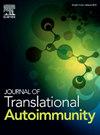Autoimmune diseases and cardiovascular risk: Mendelian randomization analysis for the impact of 19 autoimmune diseases on 14 cardiovascular conditions
IF 3.6
Q2 IMMUNOLOGY
引用次数: 0
Abstract
Backgroud
Autoimmune diseases (AIDs) have been associated with various cardiovascular diseases (CVDs) in observational data. However, the causality of these associations remains uncertain. Therefore, a systematic assessment of the impact of AIDS on cardiovascular risk is required.
Results
We assessed the impact of 19 common AIDs on 14 CVDs using bidirectional Mendelian randomization (MR). Celiac disease (odds ratio [OR] = 2.949, 95 % confidence interval [CI]: 1.111–7.827, P = 0.030) and type 1 diabetes mellitus (T1DM) (OR = 1.044, 95 % CI: 1.021–1.068, P = 1.82e-4) were associated with an increased risk of peripheral arterial disease (PAD). Additionally, celiac disease was linked to an increased risk of arrhythmia (OR = 1.008, 95 % CI: 1.002–1.013, P = 0.004), multiple sclerosis to venous thromboembolism (OR = 1.001, 95 % CI: 1.000–1.001, P = 0.010), and psoriasis to heart failure (OR = 1.048, 95 % CI: 1.021–1.077, P = 0.001). Sensitivity analyses were conducted to enhance the robustness of these findings. Predominantly, immune response and inflammation-related pathways were enriched in the aforementioned associations. Mediation analysis identified human leukocyte antigen-DR positive myeloid dendritic cells as partially mediating the effect of T1DM on PAD, with a mediated proportion of 16.61 % (P = 0.028). Potential therapeutic agents, such as tumor necrosis factor-alpha inhibitors and interferon, may have efficacy in treating AID-related CVDs.
Conclusions
This study presents genetic evidence of certain AIDs impacting specific CVDs and identifies potential mediators and drugs.
自身免疫性疾病与心血管风险:孟德尔随机分析 19 种自身免疫性疾病对 14 种心血管疾病的影响
背景在观察性数据中,自身免疫性疾病(AIDs)与各种心血管疾病(CVDs)有关。然而,这些关联的因果关系仍不确定。因此,需要对艾滋病对心血管风险的影响进行系统评估。结果我们采用双向孟德尔随机法(MR)评估了19种常见艾滋病对14种心血管疾病的影响。乳糜泻(几率比[OR] = 2.949,95%置信区间[CI]:1.111-7.827,95%置信区间[CI1.111-7.827,P = 0.030)和 1 型糖尿病(T1DM)(OR = 1.044,95 % 置信区间 [CI]:1.021-1.068,P = 1.82e-4)与外周动脉疾病(PAD)风险增加有关。此外,乳糜泻与心律失常风险增加有关(OR = 1.008,95 % CI:1.002-1.013,P = 0.004),多发性硬化与静脉血栓栓塞有关(OR = 1.001,95 % CI:1.000-1.001,P = 0.010),银屑病与心力衰竭有关(OR = 1.048,95 % CI:1.021-1.077,P = 0.001)。为了增强这些研究结果的可靠性,我们进行了敏感性分析。在上述关联中,主要是免疫反应和炎症相关通路。中介分析发现,人类白细胞抗原-DR阳性髓系树突状细胞部分中介了T1DM对PAD的影响,中介比例为16.61%(P = 0.028)。肿瘤坏死因子-α抑制剂和干扰素等潜在治疗药物可能对治疗艾滋病相关心血管疾病有疗效。
本文章由计算机程序翻译,如有差异,请以英文原文为准。
求助全文
约1分钟内获得全文
求助全文
来源期刊

Journal of Translational Autoimmunity
Medicine-Immunology and Allergy
CiteScore
7.80
自引率
2.60%
发文量
33
审稿时长
55 days
 求助内容:
求助内容: 应助结果提醒方式:
应助结果提醒方式:


